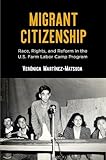Migrant Citizenship : Race, Rights, and Reform in the U.S. Farm Labor Camp Program / Verónica Martínez-Matsuda.
Material type: TextSeries: Politics and Culture in Modern AmericaPublisher: Philadelphia : University of Pennsylvania Press, [2020]Copyright date: ©2020Description: 1 online resource (376 p.) : 21 illusContent type:
TextSeries: Politics and Culture in Modern AmericaPublisher: Philadelphia : University of Pennsylvania Press, [2020]Copyright date: ©2020Description: 1 online resource (376 p.) : 21 illusContent type: - 9780812252293
- 9780812297157
- 331.5/44097309043 23
- online - DeGruyter
| Item type | Current library | Call number | URL | Status | Notes | Barcode | |
|---|---|---|---|---|---|---|---|
 eBook
eBook
|
Biblioteca "Angelicum" Pont. Univ. S.Tommaso d'Aquino Nuvola online | online - DeGruyter (Browse shelf(Opens below)) | Online access | Not for loan (Accesso limitato) | Accesso per gli utenti autorizzati / Access for authorized users | (dgr)9780812297157 |
Frontmatter -- CONTENTS -- Introduction -- Chapter 1. Securing (Re)productive Labor: State Intervention in Migrant Housing and Farmworkers’ Rights -- Chapter 2. Planning Migrant Communities: The Camps’ Built Environment and the Formation of a New Socioeconomic Order -- Chapter 3. Traversing the Boundaries of Camp Life: Migrants’ Community Within and Beyond the Federal Camps -- Chapter 4. “A Chance to Live”: The Fight for Migrant Health and Medical Reform Under the Farm Security Administration -- Chapter 5. The Contested Meaning of Migrant Citizenship: Farmworkers’ Education, Politicization, and Civil Rights Claims -- Chapter 6. The Demise of the Camp Program: Industrial Farming and the Embattled Welfare State -- Epilogue -- Appendix -- Notes -- Index -- Acknowledgments
restricted access online access with authorization star
http://purl.org/coar/access_right/c_16ec
An examination of the Farm Security Administration's migrant camp system and the people it servedToday's concern for the quality of the produce on our plates has done little to guarantee U.S. farmworkers the necessary protections of sanitary housing, medical attention, and fair labor standards. The political discourse on farmworkers' rights is dominated by the view that migrant workers are not entitled to better protections because they are "noncitizens," as either immigrants or transients. Between 1935 and 1946, however, the Farm Security Administration (FSA) intervened dramatically on behalf of migrant families to expand the principles of American democracy, advance migrants' civil rights, and make farmworkers visible beyond their economic role as temporary laborers. In more than one hundred labor camps across the country, migrant families successfully worked with FSA officials to challenge their exclusion from the basic rights afforded by the New Deal.In Migrant Citizenship, Verónica Martínez-Matsuda examines the history of the FSA's Migratory Labor Camp Program and its role in the lives of diverse farmworker families across the United States, describing how the camps provided migrants sanitary housing, full on-site medical service, a nursery school program, primary education, home-demonstration instruction, food for a healthy diet, recreational programing, and lessons in participatory democracy through self-governing councils. In these ways, she argues, the camps functioned as more than just labor centers aimed at improving agribusiness efficiency. Instead, they represented a profound "experiment in democracy" seeking to secure migrant farmworkers' full political and social participation in the United States. In recounting this chapter in the FSA's history, Migrant Citizenship provides insights into public policy concerning migrant workers, federal intervention in poor people's lives, and workers' cross-racial movements for social justice and offers a precedent for those seeking to combat the precarity in farm labor relations today.
Mode of access: Internet via World Wide Web.
In English.
Description based on online resource; title from PDF title page (publisher's Web site, viewed 27. Jan 2023)


